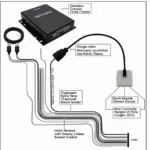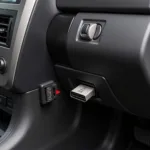The dreaded P0456 code. This code is a common headache for many Toyota owners, but what does it mean? In essence, your car’s computer has detected a small leak in the Evaporative Emission Control (EVAP) system. While this might sound intimidating, understanding what causes this code, how to diagnose it, and your options for fixing it can save you time, money, and unnecessary stress.
Understanding the EVAP System and Code P0456
Before we delve into the specifics of the P0456 code, let’s clarify what the EVAP system does. This system plays a crucial role in reducing your vehicle’s emissions. It captures fuel vapors from the gas tank and prevents them from escaping into the atmosphere. Instead, these vapors are stored in a charcoal canister and later purged into the engine to be burned during combustion.
Now, when your Toyota’s computer stores the P0456 code, it signifies that it has detected a small leak within this system. This means that fuel vapors might be escaping, potentially impacting your vehicle’s emissions and fuel economy.
Common Causes of a P0456 Code in Toyotas
Several culprits can trigger the P0456 code in your Toyota. Here are some of the most frequent causes:
- Loose or Damaged Gas Cap: A loose or faulty gas cap is often the leading cause of this code. It’s the simplest fix, so always start your diagnosis here.
- Cracked or Damaged EVAP Lines: Over time, the EVAP lines, typically made of rubber or plastic, can become brittle, crack, or detach, leading to leaks.
- Faulty Purge or Vent Solenoid: These solenoids act as gates, controlling the flow of fuel vapors within the EVAP system. If either malfunctions, it can disrupt the system’s pressure and trigger the code.
- Leaking Charcoal Canister: The charcoal canister, responsible for absorbing fuel vapors, can develop leaks over time, particularly if it has become saturated.
- Fuel Tank Pressure Sensor Malfunction: This sensor monitors the pressure within the EVAP system. If it fails, it can send inaccurate readings to the car’s computer, causing the P0456 code.
Diagnosing the P0456 Code
While a loose gas cap is often the easiest fix, assuming that’s the only problem without proper diagnosis can lead to unnecessary repairs. Here’s a systematic approach to help you pinpoint the exact cause:
- Visual Inspection: Begin with a thorough visual inspection of the gas cap, ensuring it’s securely tightened. Examine the EVAP lines under the vehicle for any visible cracks, damage, or disconnections.
- Check for Stored Codes: Use an OBD2 scanner to read and document all stored codes. This will provide a comprehensive view of any other issues affecting your Toyota’s emissions system.
- Smoke Test: A smoke test is a highly effective method for locating EVAP leaks. It involves injecting smoke into the system to identify any points where it escapes, visually revealing the leak’s location.
- Component Testing: If the visual inspection and smoke test don’t pinpoint the leak, you’ll need to test the functionality of individual components, such as the purge and vent solenoids, the charcoal canister, and the fuel tank pressure sensor, using a multimeter and following the manufacturer’s specifications.
Fixing the P0456 Code
The repair for your P0456 code will depend on the specific cause identified during diagnosis. Here are common fixes:
-
Tighten or Replace Gas Cap: If a loose or damaged gas cap is the culprit, simply tightening or replacing it might be sufficient.
-
Repair or Replace EVAP Lines: For cracked or damaged EVAP lines, repair or replacement is necessary.
-
Replace Faulty Solenoids or Sensors: If testing reveals a malfunctioning purge or vent solenoid, or a faulty fuel tank pressure sensor, replacing the affected component is typically the solution.
-
Replace Charcoal Canister: A leaking charcoal canister necessitates replacement to ensure proper fuel vapor absorption.
“When dealing with EVAP system repairs, it’s crucial to use high-quality OEM or equivalent parts to ensure proper fit and function, preventing future leaks and ensuring the system’s longevity.” – Mark Williams, Senior Automotive Technician
Ignoring P0456: The Risks
While a P0456 code might seem minor, especially if it’s not causing noticeable drivability issues, ignoring it can lead to:
- Increased Emissions: A leaking EVAP system releases harmful fuel vapors into the atmosphere, contributing to air pollution.
- Failed Emissions Tests: A persistent P0456 code can cause your Toyota to fail emissions tests, preventing you from renewing your vehicle registration.
- Fuel Economy Decline: While a small leak might not drastically impact fuel economy, a larger leak can lead to a noticeable reduction in miles per gallon.
- Potential Engine Damage (Rare): In rare cases, a severe EVAP leak can disrupt the air-fuel mixture, potentially leading to engine damage over time.
Conclusion
Addressing the Toyota OBD2 code P0456 promptly is essential to maintain your vehicle’s emissions compliance, fuel efficiency, and overall health. By understanding its causes, using a systematic diagnostic approach, and implementing the appropriate repair, you can ensure your Toyota remains environmentally friendly and runs smoothly for miles to come.
FAQs about Toyota OBD2 Code P0456
Can I drive my Toyota with a P0456 code?
It’s generally safe to drive for a short period with a P0456 code, especially if it’s a small leak. However, addressing it promptly is recommended to prevent potential issues.
How much does it cost to fix a P0456 code?
The repair cost varies depending on the underlying cause. A loose gas cap fix might cost a few dollars, while replacing major components like the charcoal canister can range from a few hundred to over a thousand dollars.
Can a bad gas cap trigger other codes?
Yes, a bad gas cap can sometimes trigger other EVAP-related codes besides P0456.
How often should I inspect my EVAP system?
It’s advisable to have your EVAP system inspected by a qualified mechanic at least once a year or as part of your regular vehicle maintenance schedule.
Can I fix the P0456 code myself?
While some fixes, like tightening a loose gas cap, are DIY-friendly, more complex repairs requiring specialized tools and knowledge are best left to professionals.
 Mechanic Diagnosing Toyota EVAP System
Mechanic Diagnosing Toyota EVAP System
For any further assistance or inquiries, our dedicated team of automotive experts is available 24/7 to help you through WhatsApp: +1(641)206-8880, Email: [email protected].
Learn more about other common Toyota OBD2 codes and their solutions on our website!

